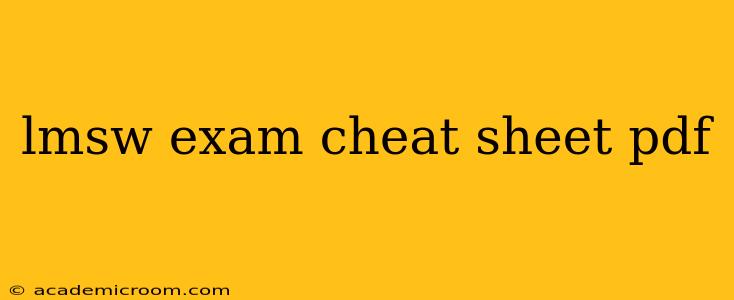The Licensed Master of Social Work (LMSW) exam is a significant hurdle in your journey to becoming a social worker. This comprehensive cheat sheet won't replace thorough study, but it will serve as a valuable tool to consolidate key concepts and boost your confidence before the big day. Remember, this is intended as a supplement to your comprehensive study materials, not a replacement.
Disclaimer: This cheat sheet is intended for informational purposes only and should not be considered a substitute for official study materials and preparation. Always refer to the official Association of Social Work Boards (ASWB) resources for the most accurate and up-to-date information.
Key Areas to Focus On:
The ASWB exam covers a broad range of topics. Here's a breakdown of the major areas, with emphasis on key concepts:
1. Human Development Across the Lifespan:
- Erikson's Stages of Psychosocial Development: Understanding the challenges and resolutions at each stage is crucial. Focus on how unresolved conflicts might manifest in adulthood.
- Cognitive Development (Piaget): Know the stages (sensorimotor, preoperational, concrete operational, formal operational) and their implications for social work practice.
- Moral Development (Kohlberg): Understand the different levels of moral reasoning and how they impact ethical decision-making.
- Biopsychosocial Model: This model emphasizes the interconnectedness of biological, psychological, and social factors in understanding human behavior. It's a foundational concept.
2. Human Behavior in the Social Environment:
- Systems Theory: Understanding systems theory is essential. Know how to analyze individuals within their family, community, and societal contexts. Focus on boundaries, homeostasis, and feedback loops.
- Ecological Systems Theory: This framework looks at the interactions between individuals and their environment, including microsystems, mesosystems, exosystems, macrosystems, and chronosystems.
- Strengths Perspective: Identify and utilize client strengths in the assessment and intervention process. This is crucial for empowering individuals and families.
3. Social Work Practice:
- Assessment: Master the skills of conducting thorough biopsychosocial assessments, including gathering information from multiple sources and identifying presenting problems and strengths.
- Intervention: Be familiar with various intervention techniques, such as cognitive behavioral therapy (CBT), solution-focused therapy, and crisis intervention. Know when each approach is most appropriate.
- Case Management: Understand the role of case management, including service coordination, advocacy, and monitoring client progress.
- Ethical Considerations: The ASWB places significant emphasis on ethical practice. Be well-versed in the NASW Code of Ethics and be prepared to address ethical dilemmas.
4. Diversity and Oppression:
- Cultural Competence: Understand the importance of cultural sensitivity and awareness in providing culturally competent services.
- Social Justice: Advocate for social and economic justice for marginalized populations. Be aware of systemic inequalities and oppression.
- Intersectionality: Recognize how multiple identities (e.g., race, gender, class) intersect to shape individuals' experiences.
Frequently Asked Questions (FAQs):
What study materials should I use? The ASWB website lists recommended study resources and practice tests. Use a combination of textbooks, practice questions, and review courses.
How many questions are on the exam? The exam typically has a significant number of multiple-choice questions. Check the official ASWB website for the most up-to-date details on exam format and content.
What is the pass rate for the LMSW exam? The pass rate varies, but it's essential to aim for comprehensive preparation to maximize your chances of success. Refer to the ASWB website for updated pass rate data.
What are some common mistakes to avoid? Don’t try to cram everything in at the last minute. Focus on understanding concepts rather than rote memorization. Practice using different question formats and time management strategies.
Where can I find practice tests? Many resources offer practice tests for the LMSW exam. Search online for reputable sources. Remember that the official ASWB practice questions are often regarded as a more accurate representation of the actual exam.
This cheat sheet is a starting point. Remember to consult the ASWB resources and use your chosen study materials effectively. Good luck!
